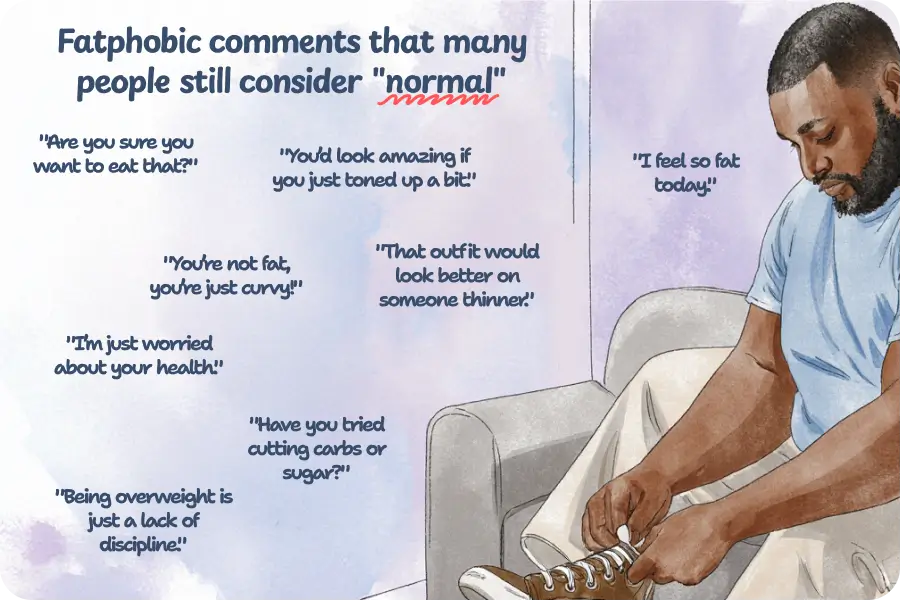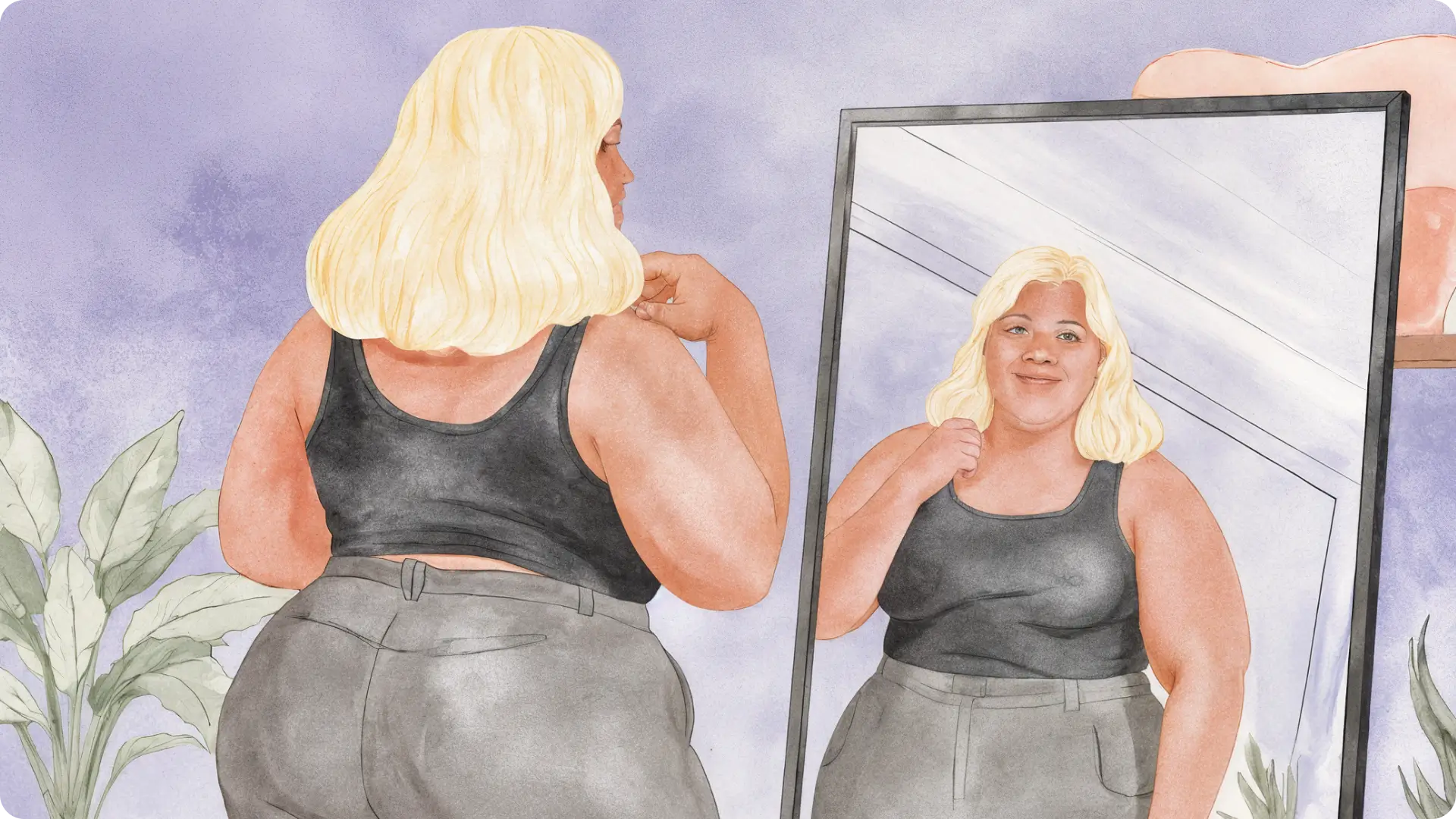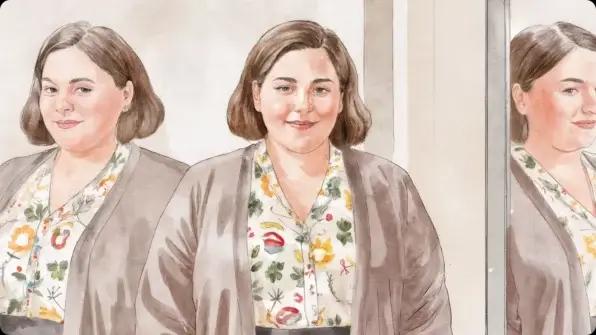TW. The article discusses topics about obesity, eating disorders, and weight discrimination. Some statements may be triggering, so if you are sensitive to these subjects, read further with care.
Fatphobic statements translate to saying that you are not enough. “You’re not skinny enough, not thin enough, not good enough.” Hearing these statements may be challenging, and they shouldn’t be the norm.
In this article, we discuss why people like to talk about others’ weight and how to deal with it. Read further if you have a “fear of getting fat” or may blame others who look different.
What is fatphobia?
Fatphobia is a fear and stigma against people with larger bodies. It doesn’t always involve overt shaming and verbal criticism but is more about non-acceptance and discrimination.
The main message fatphobic people push is that people should feel guilty about their size and should change it. Their statements mostly come from weight stigma and stereotypes that some people are worse than others. What’s more, they may believe that all factors that make people gain weight are within their personal control. [1]
Fatphobia vs. fat shaming
People experiencing body weight and health issues can encounter insensitive remarks, which is called fat shaming. This phenomenon is more overt and means directly bullying and hating other people based on their weight.
| Fatphobia | Fat shaming |
| Fear or dislike of overweight bodies. | Making someone feel bad about their weight. |
| Relates to the belief or attitude. | Is about the type of behavior. |
| Happens in society (media, fashion, healthcare) | Happens in daily conversations. |
An example of fatphobia is clothing retailers not offering larger sizes. Fat shaming, in turn, is joking about weight gain and the necessity to lose weight to look “better” or be “healthier.”
Types of fatphobia
The phobia of fat can be different, but it’s all about discrimination and weight stigma. To deal with its smaller manifestations, we need to learn how to notice them.
1. Interpersonal fatphobia
Some people may use the word “fat” as an insult. They may believe that gaining a few pounds should be the biggest tragedy in your life, and you should immediately listen to them and their advice.
Bullying at school, ambiguous comments at work, and even shaming women who have just given birth for weighing more than usual aren’t appropriate. Additionally, appearance-based compliments are so puzzling that it’s better to avoid them so as not to offend someone.
2. Internalized fatphobia (the fear of gaining body weight)
The fear of “being fat” is another manifestation of fatphobia, but an internal one. There’s nothing wrong with a desire to take care of physical health, but when that desire turns into anxiety about body size or constant comparison with others, it becomes counterproductive.
Internalized fatphobia makes people judge their worth by body image, not wellness. And it can make you feel even worse about your own self-worth. A significant distinction exists between wanting to be healthier and stronger and engaging in self-deprecating thoughts on how to stop being “fat.”
3. Systemic fatphobia
Weight stigma is about the system itself. In fact, 20% of obese women reported weight discrimination. [2] Some examples might include:
- Different body size discrimination, such as too small seats in public places.
- Employment harassment. In some workplaces, having a slimmer body is considered a competitive advantage (even if the work itself doesn’t depend on a person’s appearance). [3]
- Medical bias. When doctors demand that their patients lose weight instead of dealing with a real, unrelated issue.
4. Fatphobia in the media
Fatphobia still exists in the media as well. For instance, in the film “Identity Thief,” Sandy Patterson is showcased as a “weird” woman who can’t deal with her life. This can be the representation of overweight people that many media platforms may still promote.
And while the tendency is slowly changing, stereotypes and weight stigma still exist. Portraying people with a high body mass index as lazy or unattractive (which isn’t true) shapes public perception and reinforces harmful biases.
Have you ever faced fatphobic comments toward your body?
Phobia of “fat” — the origins
The demands of society are so high that they affect the mental health of people with diverse body sizes. The catalysts for fatphobia are the following:
Cultural influences
- Religious and cultural beliefs. Some cultures and religions praise slim people for their ability to follow some rules while believing that overweight people lack self-discipline.
- Socioeconomic factors. A few centuries ago, overweight individuals were mostly rich. But now the world has changed. People might consider that someone can’t lose weight because of a lack of money for healthy food, fitness, medical treatment, vitamins, etc. It is often correct, but the weight stigma is still too strong.
Stereotypes
- Laziness. Some people allow themselves to make fatphobic comments, as they believe that people with larger bodies are lazy. Yet, it isn’t always the case, and gaining weight can result from health problems, genetics, socioeconomic status, etc. Or it can even be a choice that a person has every right to make.
- Unattractiveness. Some just consider “fat” people as unattractive. While there’s nothing wrong with personal preferences, fatphobia and shaming shouldn’t come to the stage.
- Moral judgment. “She can’t keep a healthy diet.” “He should stop eating those sweets.” These comments may be hurtful and fatphobic. Some people think they have the right to judge someone and tell them to lose weight. However, such remarks reflect deep-seated biases and can say more about the person making them than about the one being judged.
Childhood trauma
- Dysfunctional family. It can be difficult for you to appreciate others’ body weight if your loved ones have never appreciated yours. In dysfunctional families, children get blamed for whatever goes differently from typical. And if you weren’t allowed to look and eat like you wanted, you may now believe that others aren’t allowed to do it as well.
- Narcissistic parents. In narcissistic families, a child becomes a reflection of the parent’s image rather than an independent person. The emphasis on appearance and perfection can lead to fatphobia in a family, which may affect a person into adulthood.
- Almond mom. Such mothers are overly focused on nutrition and body weight of themselves and their kids, so comments like “I ate too much yesterday. Comments like “Maybe you should skip breakfast” are likely to be very common. As a result, a kid grows up believing that weight determines their worth, which can lead to both interpersonal and internalized fatphobia.
How anti-fat attitudes influence overweight people
While some of us may not even notice it, the weight bias has a significant influence on the lives of others. This is how weight discrimination might manifest in daily life.
1. Education
Probably, in most educational institutions, there was an overweight student who experienced bullying. While this may seem like a childish thing at first, later on, it can lead to childhood trauma, low self-esteem, and lifelong discomfort when thinking about one’s body.
2. Work
Recruits and managers may discriminate against overweight employees and treat diverse body sizes differently. Stereotypes state that people with excess weight are less competent and unmotivated. [5] While it’s not true, finding work and getting a promotion may become a real challenge because of weight stigma.
3. Discrimination in healthcare settings and public health
Studies prove that weight stigma can reduce the quality of care for patients with obesity, despite healthcare providers’ best intentions to provide high-quality care. [4] Some doctors may still believe that weight can be a cause of most problems. They may avoid examination for another reason and misdiagnose people. As a result of such treatment, patients may feel afraid to seek medical help at all.
4. Mental health challenges
Experiencing fatphobia and weight stigma daily may lead to low self-esteem and increased risk of anxiety disorders and depression. Also, weight-based discrimination can cause body-related insecurities and make a person avoid social situations out of fear of judgment.
If you feel that weight-related insecurities influence your well-being, try the Breeze app. Track what makes you experience negative emotions, understand your triggers better, and learn to overcome or avoid them in daily life to feel more in control.
Eating disorders that people may develop, regardless of body size
Because of the overall stigma that overweight people are less attractive, many adolescents are developing eating disorders.
Anorexia nervosa
Anorexia is an eating disorder that makes people extremely restrict the amount of calories they intake. It often starts as a desire to lose a few pounds and may later turn into a fear of food and a distorted body image. People living with anorexia try to keep their body weight as low as possible and can stop eating completely, which is why this condition has the highest mortality rate of any psychiatric disorder. [6]
Bulimia nervosa
Another type of eating disorder, bulimia nervosa, means that a person eats large amounts of food over a short time and then vomits it intentionally. After overeating, the person may feel intense guilt and shame, which leads to compensatory behaviors.
A specific kind of this eating disorder is exercise bulimia. It means that instead of vomiting, a person engages in extremely intense and pathological exercise just to burn off the calories consumed and “undo” the effects of eating.
Binge eating disorder
This type of disordered eating behavior means that a person consumes large amounts of food over a short time and can’t stop, even when they feel completely full or in pain from overeating. Binge eating isn’t followed by vomiting or excessive exercise, but can also lead to feelings of loss of control.
Orthorexia nervosa
While it may seem like taking care of mental and physical health, orthorexia is an unhealthy obsession with eating only “clean” or “pure” foods. People with anorexia restrict a lot of meals to eat “healthily” and exercise a lot, even when they feel sick or have no energy left. They may spend hours planning meals or get anxious about eating something “imperfect.”
These 4 types of eating disorders are the most common and are actively discussed in the context of diet culture and weight stigma. However, there are many other forms of disordered eating that don’t always fit neatly into these categories. And while everyone’s situation is unique, weight discrimination is one of the main drivers of body dissatisfaction.

5 tips for addressing weight stigma
The fat acceptance movement has become more influential over the last few decades. Yet, to overcome fatphobia completely, everyone needs to take part in changing the way society views body size. Save the tips below to start building a more inclusive world where there’s a place for everyone.
1. Look at your ideas from a different angle
Confessing that you’re fatphobic requires lots of strength and self-awareness. If you’ve already understood it, it’s time to appreciate that weight stigma is a representation of your fears and insecurities.
Perhaps you don’t allow yourself to be different and go against societal norms. You can start by writing down stereotypes and assumptions about overweight individuals you believe in. For example:
- “Overweight people are lazy or lack willpower.”
- “Being thin always means having better physiological and psychological health.”
- “Gaining weight shows a lack of self-control.”
- “It’s acceptable to comment on someone’s body for their own good.”
Now, try to reform these statements into something less fatphobic. For instance, it can sound like, “I shouldn’t care about others’ bodies,” or “Everyone is valuable no matter the person’s weight.”
Rychel Johnson, M.S., LCPC, comments, “Fatphobia is a learned behavior that we can’t always help, BUT we can take intentional steps to shift our beliefs and how we perceive people. Challenge yourself regularly by educating yourself on body weight stigma and reading about the stories of people who experience overt fatphobia from health professionals and in social settings. By challenging negative beliefs and attitudes about fatness and embracing body positivity, you can contribute to creating a more inclusive and accepting society for people of all body sizes.”
2. Avoid negative self-talk
You never know what happens in someone’s life, so judging is the worst decision possible. Remember that size doesn’t evaluate the person, the character, the intelligence, or how we live. There are dozens of more important things to notice than the weight of a stranger in front of you.
The longer you treat yourself and others with kindness inside your head, the less you want to spill something negative onto loved ones and strangers. Positive thoughts create a ripple effect, fostering better relations and reducing the tendency to project negative attitudes toward yourself and those around you.
3. Work on your self-esteem
You may also need to work on your self-esteem to handle internalized fatphobia and make others’ appearance not matter to you anymore. In particular:
- Focus on what your body can do, not how it looks. Appreciate your body for its strength, resilience, and the experiences it allows you to live through, whether it’s hiking, dancing, or having long walks with loved ones.
- Surround yourself with supportive people. Stay close to people who don’t support fatphobia and value personality over someone’s weight.
- Read more about the fat acceptance movement and its mission. Learning about this movement helps you understand how societal beauty standards developed and accept that you shouldn’t necessarily follow them.
- Try gratitude journaling. The Breeze app allows you to notice happy moments in everyday life. When you shift focus from the body to the life happening around, weight bias starts to lose its power over you.
4. Focus on the personality rather than the way someone looks
- When talking about someone, avoid fatphobic terms like “fat” or “obese,” but rather focus on personality, achievements, and communication.
- Don’t make assumptions about someone’s weight and health just because of the way they look.
- Never comment on someone’s eating habits, even if you have a meal together.
- Avoid weight-biased media and content that promotes unrealistic body ideals.
5. Challenge people around you
Most of us don’t even understand the influence of diet culture on our daily lives, but you can change it. Respectfully but persistently explain to your loved ones that size doesn’t identify people, and it shouldn’t be the reason for weight discrimination. You can also speak up against weight-stigmatizing jokes in a friend group you’re in and encourage more mindful, body-positive conversations.
Frequently asked questions
How do you know if you are fatphobic?
- You believe that some people are better than others because of their weight.
- You engage in disordered eating behaviors (such as restricting food and overexercising) because you fear gaining weight.
- You automatically associate gaining weight with negative health outcomes.
- You believe that weight loss is always something positive.
- You judge your self-worth or others’ based on body size.
- You have a pathological fear of gaining a few kilograms.
What is another word for fatphobic?
Other words that describe fatphobic people are “weight-biased,” “weight-stigmatized,” “sizeist,” and “weight-prejudiced.”
Sources
- Puhl RM, Heuer CA. “Obesity stigma: important considerations for public health.” Am J Public Health. 2010
- By Rebecca Puhl, PhD. “Weight Discrimination: A Socially Acceptable Injustice.”
- Giel KE, Thiel A, Teufel M, Mayer J, Zipfel S. “Weight bias in work settings – a qualitative review.” Obes Facts. 2010
- Phelan SM, Burgess DJ, Yeazel MW, Hellerstedt WL, Griffin JM, van Ryn M. “Impact of weight bias and stigma on quality of care and outcomes for patients with obesity.” Obes Rev. 2015
- Zacher, Hannes & von Hippel, Courtney. (2022). “Weight-Based Stereotype Threat in the Workplace: Consequences for Employees with Overweight or Obesity.” International Journal of Obesity.
- Auger N, Potter BJ, Ukah UV, Low N, Israël M, Steiger H, Healy-Profitós J, Paradis G. “Anorexia nervosa and the long-term risk of mortality in women.” World Psychiatry. 2021
Disclaimer
This article is for general informative and self-discovery purposes only. It should not replace expert guidance from professionals.
Any action you take in response to the information in this article, whether directly or indirectly, is solely your responsibility and is done at your own risk. Breeze content team and its mental health experts disclaim any liability, loss, or risk, personal, professional, or otherwise, which may result from the use and/or application of any content.
Always consult your doctor or other certified health practitioner with any medical questions or concerns
Breeze articles exclusively cite trusted sources, such as academic research institutions and medical associations, including research and studies from PubMed, ResearchGate, or similar databases. Examine our subject-matter editors and editorial process to see how we verify facts and maintain the accuracy, reliability, and trustworthiness of our material.
Was this article helpful?






